八年级上册英语复习资料
人教版八年级英语上册知识点总结和复习要点
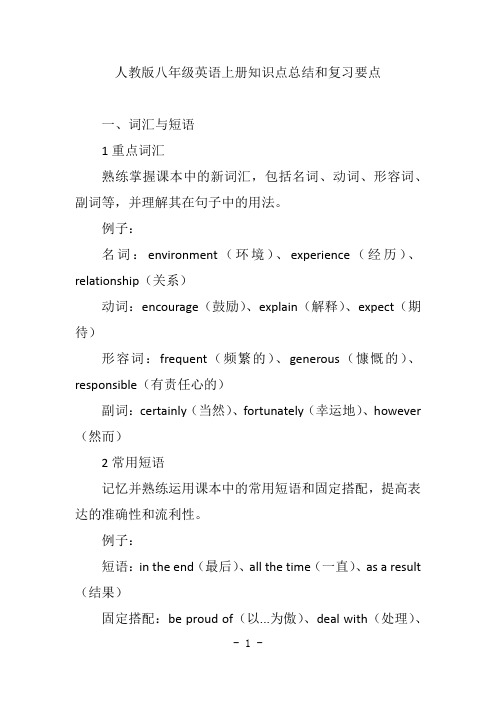
人教版八年级英语上册知识点总结和复习要点一、词汇与短语1重点词汇熟练掌握课本中的新词汇,包括名词、动词、形容词、副词等,并理解其在句子中的用法。
例子:名词:environment(环境)、experience(经历)、relationship(关系)动词:encourage(鼓励)、explain(解释)、expect(期待)形容词:frequent(频繁的)、generous(慷慨的)、responsible(有责任心的)副词:certainly(当然)、fortunately(幸运地)、however (然而)2常用短语记忆并熟练运用课本中的常用短语和固定搭配,提高表达的准确性和流利性。
例子:短语:in the end(最后)、all the time(一直)、as a result (结果)固定搭配:be proud of(以...为傲)、deal with(处理)、pay attention to(注意)二、句型与语法1基本句型熟练掌握五种基本句型,包括主语+谓语、主语+谓语+宾语、主语+谓语+间接宾语+直接宾语、主语+谓语+宾语+宾语补足语、主语+系动词+表语。
例子:主语+谓语:She sings.(她唱歌。
)主语+谓语+宾语:I like apples.(我喜欢苹果。
)主语+谓语+间接宾语+直接宾语:He gave me a book.(他给了我一本书。
)主语+谓语+宾语+宾语补足语:I found the book interesting.(我发现这本书很有趣。
)主语+系动词+表语:She is beautiful.(她很漂亮。
)2时态深入学习并掌握现在完成时、过去进行时、一般将来时、过去将来时等时态的用法和形式。
例子:现在完成时:I have already seen that movie.(我已经看过那部电影了。
)过去进行时:They were playing football when I called them.(我打电话给他们时,他们正在踢足球。
八年级上册英语期中复习资料

⼀、重点单词1、against 可以⽤来表⽰跟某⼈/某个班级等进⾏的⽐赛。
如:We are going to have a basketball game against Class Three on Sunday.2、win sth. 例如:win a game, win a race, win a gold medal, win first place【注意】win不能⽤于win sb.,要说打败某⼈,应该⽤beat /defeat sb.3、join:①join sb.表⽰“加⼊某⼈的⾏列,和某⼈⼀起”如 Will you join us?你愿意加⼊我们吗?②join +组织表⽰“加⼊某个组织”如 I am going to join the school music club.我打算加⼊学校⾳乐俱乐部。
③join in +活动表⽰“参加某项活动”如 Jane is going to join in the volleyball match next week.简打算下周参加排球赛。
【联想】take part in+活动(相当于“join in +活动”),表⽰“参加某项活动”。
要注意与join的⽤法区别,join要加某⼈或某个组织,join in才能加“某项活动”(= take part in+活动)。
4、ski现在分词为skiing [同学们不要觉得怪怪的,就是这样⼦]5、row要变成ing形式时,直接加ing,即rowing,因为ow是字母组合。
6、dream(“梦,梦想”之意)是可数名词。
7、job是可数名词,work是不可数名词(work还可以做动词)。
8、exercise①跟体育运动有关的运动、锻炼,是不可数名词。
但要注意如果是做早操或眼保健操exercise要加s②指书本上的练习、作业,是可数名词。
9、①ill不能作定语,⼀般作表语。
②sick可作定语也可作表语。
The child is ill. 也可说The child is sick.a sick child(不能说 an ill child)10、competition竞赛 [可数名词]11、score ⑴作为动词是“得分”的意思。
八上英语背记知识点

八上英语背记知识点一、名词复数的不规则变化一般情况下,直接在名词词尾加s。
例如:book(书)——books(书)。
以s, x, sh, ch结尾的名词,在词尾加es。
例如:bus(公共汽车)——buses(公共汽车)。
以“辅音字母+y”结尾的名词,变y为i再加es。
例如:city(城市)——cities(城市)。
以f或fe结尾的名词,把f或fe变成v再加es。
例如:knife(刀)——knives(刀)。
以o结尾的名词,有些加es,有些加s。
例如:photo(照片)——photos(照片),zoo(动物园)——zoos(动物园)。
二、动词第三人称单数形式动词第三人称单数形式是在动词后面加“-s”或“-es”。
例如:play(玩)——plays(玩)。
有些动词第三人称单数形式比较特殊,需要单独记忆。
例如:be动词原形是“be”,第三人称单数形式是“is”。
三、情态动词情态动词是表示可能性、必要性、意愿等情感的动词,常用的情态动词有can、may、must 等。
can表示可能性,常用于否定句和疑问句中。
例如:I can’t swim. 我不会游泳。
may表示可能性或请求许可,常用于肯定句和疑问句中。
例如:You may go now. 现在你可以走了。
must表示必要性或必须,常用于肯定句中。
例如:You must finish your homework. 你必须完成作业。
四、现在进行时现在进行时是表示正在进行的动作或存在的状态,其结构是“be+动词-ing”形式。
be动词用现在进行时的形式是“am/is/are”,根据主语人称而定。
例如:I am watching TV. 我在看电视。
动词-ing形式由动词原形+ing构成,其形式与现在分词相同。
例如:swimming(游泳)、playing (玩)、eating(吃)。
五、一般现在时一般现在时是表示经常发生的动作或存在的状态,其结构是“主语+动词原形”或“主语+动词第三人称单数形式”。
八年级上册英语复习提纲
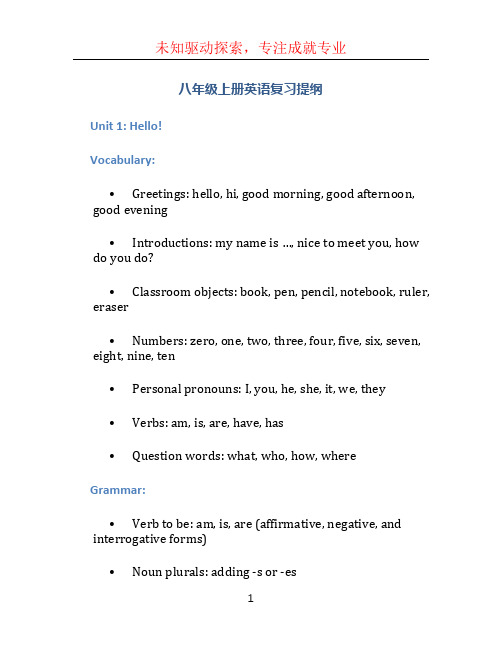
八年级上册英语复习提纲Unit 1: Hello!Vocabulary:•Greetings: hello, hi, good morning, good afternoon, good evening•Introductions: my name is …, nice to meet you, how do you do?•Classroom objects: book, pen, pencil, notebook, ruler, eraser•Numbers: zero, one, two, three, four, five, six, seven, eight, nine, ten•Personal pronouns: I, you, he, she, it, we, they•Verbs: am, is, are, have, has•Question words: what, who, how, where Grammar:•Verb to be: am, is, are (affirmative, negative, and interrogative forms)•Noun plurals: adding -s or -es•Possessive adjectives: my, your, his, her, its, our, their•Present simple tense: affirmative, negative, and interrogative forms•Demonstrative pronouns: this, that, these, those•Wh-questions: what, who, how, where (asking for information)Skills:•Greeting and introducing oneself to others•Describing classroom objects•Expressing possession•Asking and answering questions about people and objects•Giving personal information•Describing daily routinesUnit 2: School LifeVocabulary:•Classroom subjects: English, math, science, history, geography•School facilities: library, laboratory, computer room, playground•School supplies: pencil case, backpack, textbook, notebook•Adjectives to describe school: big, small, old, new, interesting, boring•Daily routines: get up, have breakfast, go to school, have lunch, go home, do homeworkGrammar:•Present simple tense: negative and interrogative forms•Adjectives for describing objects•Adverbs of frequency: always, usually, often, sometimes, rarely, never•Demonstrative pronouns: this, that, these, those (review)•Prepositions of time: in, on, at (for daily routines)•Imperatives: get up, have breakfast, go to school, etc. (giving orders or instructions)Skills:•Talking about school subjects and facilities•Describing school supplies and personal routines•Giving instructions or orders•Talking about frequency of activities•Understanding prepositions of timeUnit 3: Family and FriendsVocabulary:•Family members: mother, father, sister, brother, grandparents, aunt, uncle•Personal characteristics: kind, friendly, funny, smart, talented•Possessions: toys, clothes, shoes, books, bags•Adjectives to describe people: tall, short, thin, fat•Verbs for family activities: eat, drink, play, watch, sing, dance, readGrammar:•Possessive pronouns: mine, yours, his, hers, ours, theirs•Present simple tense: affirmative, negative, and interrogative forms (review)•Adjectives for describing people•Action verbs for activities•Wh-questions: who, what (review)Skills:•Talking about family members and personal characteristics•Describing possessions and appearance•Talking about activities with family and friends•Asking and answering questions about people and objectsUnit 4: Hobbies and InterestsVocabulary:•Hobbies: swimming, cycling, painting, playing soccer, reading, singing, dancing•Musical instruments: guitar, piano, violin, drums•Sports: basketball, baseball, tennis, volleyball, table tennis•Leisure activities: watching movies, playing computer games, shopping, traveling•Adjectives to describe hobbies and interests: fun, interesting, relaxing, excitingGrammar:•Present continuous tense: affirmative, negative, and interrogative forms•Adverbs of manner: carefully, well, quickly, slowly•Comparatives and superlatives: long, longer, longest; good, better, best•Prepositions of place: in, on, at (talking about locations)•Wh-questions: what, who, where, when (review) Skills:•Talking about hobbies and interests•Describing leisure activities•Talking about ongoing actions•Comparing things with superlative and comparative forms•Asking and answering questions about hobbies and interestsUnit 5: My CityVocabulary:•Buildings: school, hospital, library, supermarket, park, restaurant, bank•Places in the city: street, square, bus stop, train station, airport•Directions: turn left, turn right, go straight ahead•Modes of transportation: bus, subway, taxi, bike, car •Adjectives to describe cities: big, small, crowded, peaceful, modern, historicGrammar:•Present continuous tense: negative and interrogative forms (review)•Prepositions of place: in, on, at (review)•Simple future tense: will (affirmative, negative, and interrogative forms)•Imperatives for giving directions: turn left, go straight ahead, etc. (review)•Wh-questions: where, how (for asking about locations and directions)Skills:•Talking about buildings and places in the city•Describing cities and transportation modes•Giving and following directions in a city•Talking about future plans or activities in a city•Asking and answering questions about locations and directions。
八年级上册知识点汇总英语
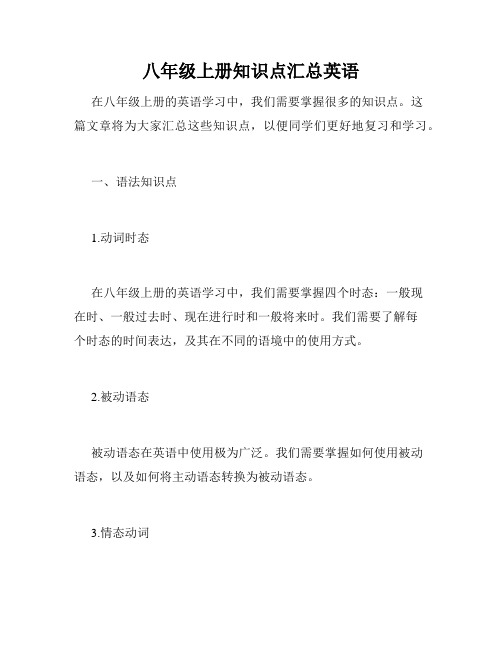
八年级上册知识点汇总英语在八年级上册的英语学习中,我们需要掌握很多的知识点。
这篇文章将为大家汇总这些知识点,以便同学们更好地复习和学习。
一、语法知识点1.动词时态在八年级上册的英语学习中,我们需要掌握四个时态:一般现在时、一般过去时、现在进行时和一般将来时。
我们需要了解每个时态的时间表达,及其在不同的语境中的使用方式。
2.被动语态被动语态在英语中使用极为广泛。
我们需要掌握如何使用被动语态,以及如何将主动语态转换为被动语态。
3.情态动词情态动词是一种特殊的动词形式,包括can、could、may、might、must、shall、should、will和would等。
我们需要了解每个情态动词的意义和用法。
4.虚拟语气虚拟语气用于表达可能的假设、愿望、虚拟的情况、建议等。
我们需要学会使用虚拟语气,并注意不同情况下的使用方式。
二、单词和词组知识点1.常用动词和形容词在八年级上册的英语学习中,我们需要掌握一些常用的动词和形容词。
例如:finish、like、enjoy、happy、sad、angry等。
这些单词经常出现在日常生活中,因此我们需要熟练掌握它们。
2.常用词组熟练掌握一些常用词组对于我们的英语学习是非常有帮助的。
例如:take care of、look forward to、work on、pay attention to等。
这些词组在我们的英语表达中使用频率较高,因此我们需要注意学习它们的用法。
3.其他单词和词组在八年级上册的英语学习中,我们还需要学习一些其他的单词和词组。
例如:transportation、entertainment、wildlife、historic sites、directions等。
这些单词和词组与生活中的各个方面相关,我们需要在学习它们的同时了解它们的实际意义和使用场合。
三、阅读理解知识点1.注意细节在进行阅读理解时,我们需要注意细节。
这包括阅读材料的文字表述、时间和地点等信息,以及与阅读内容相关的语言技能。
八年级上册英语考点复习资料
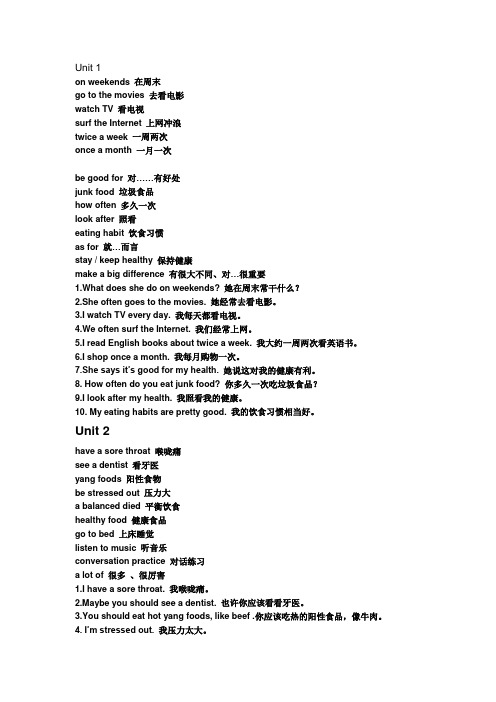
Unit 1on weekends 在周末go to the movies 去看电影watch TV 看电视surf the Internet 上网冲浪twice a week 一周两次once a month 一月一次be good for 对……有好处junk food 垃圾食品how often 多久一次look after 照看eating habit 饮食习惯as for 就…而言stay / keep healthy 保持健康make a big difference 有很大不同、对…很重要1.What does she do on weekends? 她在周末常干什么?2.She often goes to the movies. 她经常去看电影。
3.I watch TV every day. 我每天都看电视。
4.We often surf the Internet. 我们经常上网。
5.I read English books about twice a week. 我大约一周两次看英语书。
6.I shop once a month. 我每月购物一次。
7.She says it’s good for my health. 她说这对我的健康有利。
8. How often do you eat junk food? 你多久一次吃垃圾食品?9.I look after my health. 我照看我的健康。
10. My eating habits are pretty good. 我的饮食习惯相当好。
Unit 2have a sore throat 喉咙痛see a dentist 看牙医yang foods 阳性食物be stressed out 压力大a balanced died 平衡饮食healthy food 健康食品go to bed 上床睡觉listen to music 听音乐conversation practice 对话练习a lot of 很多、很厉害1.I have a sore throat. 我喉咙痛。
八年级上册英语必考知识点

八年级上册英语必考知识点八年级上册英语的学习是初中英语学习的关键阶段,涵盖了丰富的语法知识和词汇。
为了帮助同学们更好地备考,本文将梳理八年级上册英语中的一些必考知识点,帮助大家系统地复习和巩固所学内容。
一、重点词汇八年级上册英语涉及了大量新词汇,其中包括一些常用的动词、名词、形容词和副词等。
例如:动词:include, suggest, compare, prefer, provide等名词:environment, pollution, invention, education等形容词:important, necessary, convenient, useful等副词:always, usually, often, sometimes, never等二、基本语法本学期的语法学习主要集中在一般现在时、一般过去时、现在进行时和一般将来时四种时态上。
同时,也会接触到一些基本的复合句和状语从句。
时态:一般现在时:表示经常性或习惯性的动作,如:I usually goto school by bus.(我通常乘公交车去学校。
)一般过去时:表示过去某个时间发生的动作或存在的状态,如:I went to the zoo last weekend.(我上周末去了动物园。
)现在进行时:表示正在进行的动作或发生的情况,如:She is studying for the exam.(她正在为考试而学习。
)一般将来时:表示将来某个时间将要发生的动作或存在的状态,如:I will meet my friend at the park tomorrow.(我明天会在公园和朋友见面。
)复合句:主句和从句构成的句子,如:I think(主句) that he will come(从句).(我认为他会来。
)状语从句:用来修饰主句中的动词、形容词或副词等的从句,如:If it rains(条件状语从句), we will stay at home.(如果下雨,我们就会待在家里。
八年级上册英语期末复习知识点整理

八年级上册英语期末复习知识点整理八年级上册英语期末复习知识点整理马上就要开学咯,你做好复习的准备了吗,本文是店铺为大家整理的八年级上册英语期末知识点资料汇总,希望能给同学们带来帮助!Module 11.study plan学习计划2.a number of +可数名词复数+V(复数):许多、大量the number of+可数名词复数+V(单数):……的数量3.advice不可数名词a piece of advice一条建议give sb. someadvice给某人一些建议advise sb. to dosth.建议某人去做某事4.write it/themdown把它写下来5. what else?还有什么其他的?6. It is adj. forsb. to do sth.7. It is a goodidea to do sth.8.meet sb.接某人9.this term这学期last term上学期next term下学期10. help sb. dosth.help sb. with sth.11.ask for advice征求意见12.basic questions基本问题13.spend… on sth.spend …(in) doingsth.花费时间做某事sth cost sb some moneyIt takes sb. sometime to do sth.pay for14.the meaning of….的意思15.speak to sb.与某人谈话16.take a deepbreath深呼吸17.start aconversation开始一段谈话18.talk about sth.with sb.跟某人谈论某事19.表示建议的句子①What about doing=How about doing…?②Why not do=Why don’t you do..?③Try (not) to do sth.④should do⑤It’s a good idea to do sth.⑥Would you like to do sth.⑦Let sb do sth.⑧Remember to do sth.=Don’t forget to do sth.⑨you’d better do sth.其他知识点:1.give up放弃2. ask sb. to dosth.让某人去做某事3.improve oneself提高某人rmation消息信息,不可数名词5.leave sth.落下什么东西6.as作为7.like 喜欢、像8.at the age of在……岁时9.experience经验(不可数名词)experience经历(可数名词)work工作(不可数名词)著作(可数名词)Job工作(可数名词)10.once/twice/threetimes提到次数的时候,用现在完成时11.finish doingsth.完成做某事12.go off灯熄灭13.so far 迄今为止(现在完成时)14.lose one’sway=lose oneself迷路15.be away from远离16. be sorry to dosth.17.listen to theradio听收音机18.write to sb.写给某人19.would like todo sth.愿意去做某事20. want to dosth.21. adj enough todo sth.22.try one’s bestto do sth.尽某人最大能力去做某事23. everyday (adj.)every day(adv.)24.teacher withglasses戴眼镜的老师Module 2travel around theworld环球旅行invite sb. to dosth.邀请某人去做某事stay with sb.跟某人呆在一起one day总有一天1.put on take off穿上,脱下land in 着陆 take off起飞2. the price of…… ……的价钱3.dream of/aboutsth.梦到某物4. What do youreckon?What do you thinkof…?How do you like…?5.have been to 去了回来了have gone to 去了没回来6.fly to sw.飞到某地because+句子because of +n./名词短语7.western food西方食物8.more than=over 超过9.sell out卖光e true实现Module 31. What are you upto? =what are you doing?你正在做什么? up to忙于做某事2.just now刚刚(一般过去时)the latest news最新消息3. Don’t panic!不要惊慌4.on the news在新闻上5.in space在太空6.on business出差7. show sth. tosb.=show sb. sth.8. borrow sth.from sb.lend sth. to sb.lions of 数以百万计的具体数字+million10.none of+可数名词复数+V单数11.be called…被叫做……12.also用于句中too 用于句末,但有逗号as well用于句末,但没有逗号13.grow up长大14.alone无感情色彩be alonelonely有感情色彩feel lonely15.prefer A to Bprefer doing A todoing Bprefer to do Arather than do B16.so far迄今为止(现在完成时)17.feel like doingsth.喜欢做某事18.as adj.(原级) as 像……一样19.so that如此……以至于20.现在完成时的结构主语+have/has动词的过去分词just/already一般用于肯定句yet一般用于否定句和疑问句① for+一段时间(for five years)② since+一个时间点(since 8 o’clock yesterday)③ since+具体的年份(since 1990)④ since+一段时间+ago(since five years ago)当有一段时间存在时,终止性动词必须变成延续性动词① die → be dead② begin/start → be on③ buy → have④ borrow → keep⑤ come/go → beModule 41.how long多久2.get on well withsb.与某人相处融洽3. learn a foreignlanguage4. the Hope School5.Project Hope希望工程6.poor children贫困儿童7.in fact事实上8.tell me more说的更多点9.how long用for+一段时间/since+时间点回答how often用频度副词来回答how soon用in+一段时间提问(一般是一般将来时)how far多远,提问路程多远10.take part 参加11.aneight-year-old boy12.drop out ofschool辍学13.on the farm在农场上14.be ill生病15.have to do sth.不得不去做某事16.get aneducation得到教育17.with the help of在……的帮助下18.people in Chinaand abroad国内外的人们19.because of由于luck (n.)→lucky (adj.)→luckily (adv.)care (n.)→careful(adj.) →carefully (adv.)20.反意疑问句:前肯后否、前否后肯反意疑问句必须换成主语的代词谓语动词在时态和人称上要保持一致表示否定意义的词:never/hardly/few/little/nothing/seldom/no① there be→be there?② You’d better→hadn’t you?③ Let’s→shall we?④ Let us→will you?⑤ 祈使句→will you?⑥ 一般现在时→do/does 主语?⑦ 现在进行时→am/is/are 主语?⑧ 一般过去时→did 主语?⑨ 过去进行时→was/were 主语?⑩ 现在完成时→have/has 主语?⑾情态动词→情态动词主语?若句子里含有否定的意义,那么yes翻译成“不”,no翻译成“是”Module 51.反意疑问句的相关知识P1722.Who is it by?由……作曲3.be sure of/aboutsth.对某事有把握、确信4.be sure to dosth.确信去做某事5.hear of sth.听说6.the capital of……的首都7.what’s yourfavourite…你最喜欢的……是什么?8.a fan of……的粉丝9.give us a break休息一会10.I don’t believeit!我不相信它!11.not only..butalso..不但……而且……(就近原则)12.describe Chinato the rest of the world把中国介绍给世界的其他部分13.bring westernand Chinese music together把中西方音乐结合14.in additionto=besides除了Module 61. How is it going?过的怎么样?2. send sb. sth.=send sth. to sb.3. go on继续4. by the river在河边5. be late晚的、迟的6. in a tree人在树上on a tree 水果在树上on the grass在草地上7. smile at sb.朝某人微笑8. fall behind落后fall down=go down摔落9. every/each(每个)+V单数10. tired累的(人)tiring累的(物、事)11. have nothing to do无事可做12. what for=why13. think of认为think about考虑14. take sth. out of 拿出take away拿走带走take off飞机起飞、脱衣服15. get up起床16. on one’s way to …在某人去……的.路上17. 表示过去进行时的短语:At that time/atthat moment/at this time yesterday/at…o’clock yesterday/from…to…last night 主语+was/were+doing过去某个时刻正在做某事Module 71. smell/look/taste/feel/sound+adj.2. What’s the matter with you?What’s wrong withyou?3. be afraid+句子be afraid to dosth.害怕做某事be afraid of doingsth.4. try to do sth.try one’s best todo sth.尽某人最大能力去做某事5. What is she like?(性格、内在特征)What does she looklike?(外貌)6. introduce A to B把A介绍给Bintroduce oneself自我介绍7. hear from=get a letter from=receive aletter from收到某人来信8. thanks for sth.9. can’t wait to do sth.等不及去做某事10. when 引导的时间状语从句:主将从现11. wear glasses戴眼镜12. arrive at+小地点 arrivein +大地点reach sw.get to sw.13. sound like听起来像14. as well也15. the captain of……的队长16. be proud of…因……而骄傲17. work hard努力工作18. get/be angry with sb.be angry at/aboutsth.19. bad marks坏分数20. at first首先21. a bit=kind of稍微、有点儿Module 81. show sb. sth.=show sth. to sb.2. the map of………的地图3. over there在那儿4. do some shopping=go shopping5. 表示静止的方位:on the right/leftin the middle ofon the corner ofbetween…and…opposite…next toin front ofbehind表示动态的方位:go along=go down=walk along=walkdowngo acrossgo straight aheadturn left/rightinto…6. 表示问路的话Where is the …?How can I get tothe…?Which is the wayto the…?Can you tell methe way to the…?7. welcome to…8. a clear day晴朗的一天9. get off下车αget on上车Module 91. danger(n.) in danger处于危险中dangerous(adj.)αsafe2. beexcited to do sth.兴奋去做某事3. makesb. do sth.make sb. adj.make sb. n.4. haveno place to live in没有地方可住5. takeaway带走6. inpeace和平的7. onearth究竟8. lookfor寻找(过程)find找到(结果)find out查清(通过研究找出结果)9. besurprised to do sth.惊奇的去做某事10. look after=take care of11. there be sb./sth. doing sth.某地有sb./sth.正在做某事12. live on 以……为生13. less and less越来越少more and more越来越多14. make a plan定一个计划15. adj. enough to do sth.足够……去做某事16. go back=return返回17. the symbol of……的象征18.such as没有逗号,后面一般加n.或者短语for example一般有逗号,后面一般加句子Module 101. How is it?事情进展的怎么样?2. places of interest名胜be/becomeinterested in sth./doing sth.interested形容人interesting形容物或者事3. offer to do sth.主动提出去做某事4. agree to do sth.同意去做某事agree with sb.同意某人agree on sth.同意某事5. almost几乎hardly几乎不(表示否定)6. though/although虽然but但是(不可以同时出现)7. have a good time=enjoy oneself8. take place=happen发生9. be famous for因……而著名be famous as作为……而著名10. the story of……的故事11. the centre of……的中心12. be born in sw./on+日子13. one of 最高级+可数名词复数+V单数14. fall in love with sb.爱上某人15. be full of=be filled with16. fill A with B把B装到A里17. find it adj. to do sth.18.plan/decide/hope/want/agree/offer/try/want/wish/begin/need/ forget/learn/+ to do sth.help/make sb. dosth.be glad to do sth.give sb. sth.=givesth. to sb.(bring/lend/hand/send/show/leave/teach)buy sb. sth.=buysth. for sb.(cook/read)Module 111. it is adj. to do sth.it is n. to do sth.it takes sb. some time to do sth.动词不定式做主语的时候,谓语动词用单数To see is not to believe.2. it is possible(impossible) to do sth.it is possible that…主语+will probably/possibly+ Veg:It will probably/possibly be sunnytomorrow.3. so… that 如此……以至于4. depend on 依赖、依靠5. 雨雪的大用heavy风的大用strong6. be + adj.adj. +n.V. +adv.7. spring,summer,autumn(fall),winter8. 不客气的几种说法:You are welcome.That’s all right.=That’s ok.With pleasure.My pleasure.It’s a pleasure.9. be pleasant to do sth.很高兴去做某事10. take photos of sth.11. bring sb. around sw.take sb. around sw.带某人到处参观12. the best place to do sth.去做某事的最好地方the best time to do sth.去做某事的最好时间13. It is a good idea/way to do sth.14. What’s the weather like?=How is the weather?What will the weather be like?=How will the weather be?15. at the moment=now16. be off to sw.动身去某地17. you’d better do sth.你最好做某事18. 不定代词(something/anything/nothing/ somebody/adybody/nobody)+adj.to do sth.19. joke with sb.跟某人开玩笑joke about sth.就某事而开玩笑tell jokes讲笑话20. between…and…在……和……之间21. from…to…从……到……22. You must be joking!Sounds great!听起来不错Come on 赶快23. too much+不可数名词太多……much too+adj.太……24. 季节/年份/月份/前+in日期前+on25. in the end可单独使用at the end of在……的最后26. n. adj.sun sunnycloud cloudyrain rainywind windysnow snowystorm stormyshower showery27. the temperature will be…the temperature of Dalian is…Module 121. stop to do sth.停下来去做某事stop doing sht. 停下来正在做的事情2. hang on 等等/别挂断3. immediately=atonce=right now4. accept 接受receive收到5. in red paper6. use both hands7. cut one’s hair8. you can’t beser ious!9. just wait andsee.10. both两者都+V复either两者中的任何一个+V单neither两者都不+V单11. make noise12. enjoy one’sstay13. not…but…不是……而是……14. be differentfrom15. the same as与……相同16. hear sb. doingsth.听到某人正在做某事hear sb. do sth. 听到某人做某事的全过程17. on time按时18. catch a cold感冒catch a bus赶公共汽车catch up withsb./sth.追赶某人/某物19. let sb. dosth.让某人做某事20. stay out呆在外面21. can提问:肯定:can否定:can’tmay提问:肯定:can否定:mustn’t/can’t/sorrymust提问:肯定:must否定:needn’t22. 物主代词后+名词a +可数名词单数介词和动词后+doing情态动词的题一般根据翻译来做有not sure一般用may/might交通规则一般用mustn’t23. There isnothing in the room, but(除了)a bed.We won’t have themeeting this afternoon but(而是) tomorrow afternoon.24. milk coffeetea water juice 都是不可数名次25. a few+可数名词复数:许多……a little +不可数名词:许多……few+可数名词复数:几乎没有……(表示否定)little+不可数名词:几乎没有……(表示否定)下载全文。
八年级上册英语总复习(知识点汇总)

八年级上册英语总复习(知识点汇总)
一、基本语法知识点
- 词汇:掌握八年级上册涉及的词汇,如名词、动词、形容词、副词等。
- 时态:熟悉一般现在时、一般过去时和一般将来时的构成和
用法。
- 句子结构:了解简单句、并列句和复合句的组成和使用方法。
- 语态:理解被动语态的构成和用法。
二、听力技巧
- 注意听力材料中的关键词,并对比选项进行判断。
- 注意听力材料中的语音语调,辨别重要信息。
- 注意时间、地点和人物等信息的提取。
三、阅读技巧
- 预览文章段落,了解大意及文章结构。
- 注意文章中的关键词,理解整个文章的主旨。
- 根据文章内容填写相关信息、选择正确答案或完成文章概述。
四、写作技巧
- 了解不同类型的写作任务,如叙述、说明、议论等。
- 练使用适当的词汇和句型表达自己的观点和想法。
- 注意书写格式、语法和拼写,提高写作质量。
五、语言知识
- 重点掌握八年级上册课本中的课文及相关练的语法、词汇和
常用句型。
- 针对容易出错的语言知识进行专项练,加深理解和记忆。
六、口语练
- 进行口语练,提高口语表达能力。
- 多参与英语口语交流,积累口语表达经验。
七、其他技巧
- 多听英语广播、看英文电影或电视剧,提高英语听力水平。
- 多做英语练题,培养解题技巧和思维能力。
以上为八年级上册英语总复习的知识点汇总,希望对你的学习有所帮助!。
八年级英语上册复习资料unit3

Unit 3 I’m more outgoing than my sister一、词组、短语:1. more outgoing 更外向/更开朗,2. as...as...与……一样,3. the singing competition 歌咏比赛,4. the most important最重要的,5. be talented in music 在音乐方面有天赋,6. the same as与……相同7. care about 关心/留意/关注,8. be different from与…不同,9. be like a mirror 像一面镜子,10. as long as与…一样长,11. bring out显示/显出/生产/带来,12. get better grade取得好成绩,13. reach for伸手达到/达到14. touch one’s heart 感动,15. in fact 事实上,16. make friends交朋友,17. be good at 在某方面成绩好,18. the other另一个,19. be similar to 对…熟悉,20. be good with与…和睦相处二、重要句子:1. Sam has longer hair than Tom. 萨姆的头发比汤姆的长。
2. She also sings more loudly than Tara. 她唱歌也比泰拉声音大。
3. Nelly sang so well. 内莉唱得如此好。
4. For me, a good friend likes to do the same things as me.对于我来说,好朋友喜欢跟我做相同的事情。
5. Who is smarter, your mother or your father ? 谁更聪明,你妈妈还是你爸爸?6. It’s not necessary to be the same. 没有必要相同。
八年级英语总复习知识清单

八年级上册Unit 1 Where did you go on vacation?重点词组1.go on vacation 去度假2. be on vacation 在度假3.go to the mountains 去爬山4.go to the beach 去海滩5.something special 一些特别的东西6.somewhere interesting 一些有趣的地方7.take quite a few photos 拍相当多的照片8.most of the time 大多数时间9.keep a dairy 写日记10.decide to do sth 决定做某事11.feel like doing sth 想要做某事12.try to do sth 尽力做某事13.try doing sth 试着做某事14. because of the bad weather 因为糟糕的天气15. one bowl of 一碗---- 16. taste good 尝起来好17.enough money 足够多的钱18. hungry enough 足够饿19.another two hours 另(又)两个小时20.so----- that----- 如此-----以致--- 21. keep doing 继续做某事22. come up 升起重点句子1,Where did you go on vacation? ---- I went to the mountains.你去哪里度假了? 我去爬山了。
2,Did you buy anything special? ----Yes, I bought something for my father.你买了一些特别的东西吗?是的,我给我爸爸买了一些。
3,Everything was excellent 一切都是极好的。
4,There was nothing much to do in the evening but read.傍晚除了阅读没什么太多可做的事。
八年级上册英语期末复习资料Unit 1 记背单
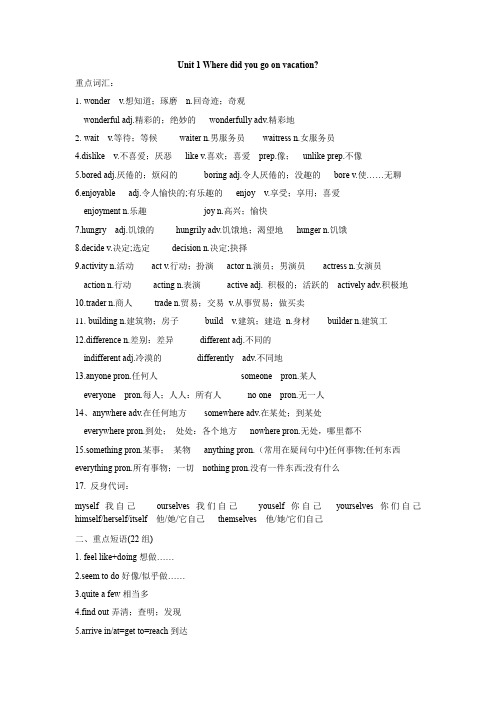
Unit 1 Where did you go on vacation?重点词汇:1.wonder v.想知道;琢磨n.回奇迹;奇观wonderful adj.精彩的;绝妙的wonderfully adv.精彩地2.wait v.等待;等候waiter n.男服务员waitress n.女服务员4.dislike v.不喜爱;厌恶like v.喜欢;喜爱prep.像;unlike prep.不像5.bored adj.厌倦的;烦闷的boring adj.令人厌倦的;没趣的bore v.使……无聊6.enjoyable adj.令人愉快的;有乐趣的enjoy v.享受;享用;喜爱enjoyment n.乐趣joy n.高兴;愉快7.hungry adj.饥饿的hungrily adv.饥饿地;渴望地hunger n.饥饿8.decide v.决定;选定decision n.决定;抉择9.activity n.活动act v.行动;扮演actor n.演员;男演员actress n.女演员action n.行动acting n.表演active adj. 积极的;活跃的actively adv.积极地10.trader n.商人trade n.贸易;交易v.从事贸易;做买卖11.building n.建筑物;房子build v.建筑;建造n.身材builder n.建筑工12.difference n.差别:差异different adj.不同的indifferent adj.冷漠的differently adv.不同地13.anyone pron.任何人someone pron.某人everyone pron.每人;人人:所有人no one pron.无一人14、anywhere adv.在任何地方somewhere adv.在某处;到某处everywhere pron.到处;处处:各个地方nowhere pron.无处,哪里都不15.something pron.某事;某物anything pron.(常用在疑问句中)任何事物;任何东西everything pron.所有事物;一切nothing pron.没有一件东西;没有什么17. 反身代词:myself我自己ourselves 我们自己youself你自己yourselves 你们自己himself/herself/itself 他/她/它自己themselves 他/她/它们自己二、重点短语(22组)1. feel like+doing想做……2.seem to do好像/似乎做……3.quite a few相当多4.find out弄清;查明;发现5.arrive in/at=get to=reach到达6.try(one's best) to do尽力/设法做某事try doing 尝试做某事7.decide to do=make a decision to do决定做某事8.can't wait to do sth.迫不及待做某事9.be/go on vacation=take/have a vacation在/去度假10.keep a diary/keep diaries写日记11.make a difference (to sb./sth.)对……产生影响12.up to取决于;多达13.because of 因为;由于14.up and down 上上下下15.in excitement=excitedly兴奋地e up 上升;出现17.go on to do继续做(另一件事) go on doing继续做(同一件事)18.have nothing to do but do除了……无事可做19.of course=certainly=sure当然;自然20.buy sth.for sb=buy sb.sth为某人买某物重点句子:1.I just stayed at home most of the time to read an relax.我大部分时间知识呆在家里读书合放松。
人教版八年级上册英语Unit1复习
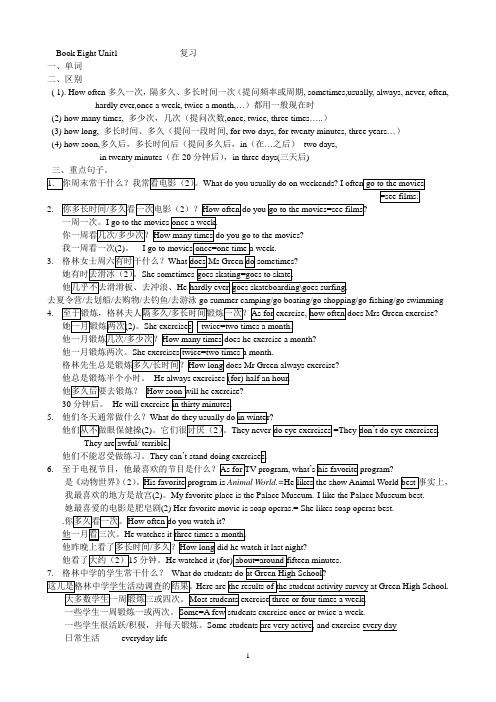
Book Eight Unit1 复习一、单词二、区别( 1). How often多久一次,隔多久、多长时间一次(提问频率或周期, sometimes,usually, always, never, often, hardly ever,once a week, twice a month,…)都用一般现在时(2) how many times, 多少次,几次(提问次数,once, twice, three times…..)(3) how long, 多长时间、多久(提问一段时间, for two days, for twenty minutes, three years…)(4) how soon,多久后,多长时间后(提问多久后,in(在…之后)two days,in twenty minutes(在20分钟后),in three days(三天后)三、重点句子。
去夏令营/去划船/去购物/去钓鱼/去游泳go summer camping/go boating/go shopping/go fishing/go swimming4.305.6.是我最喜欢的地方是故宫(2)。
My favorite place is the Palace Museum.-I like the Palace Museum best.她最喜爱的电影是肥皂剧(2) Her favorite movie is soap operas.= She likes soap operas best.日常生活everyday life为“看电视”的(调查)结果是有趣的。
The results for “watching TV” are interesting.8./可乐?How often does the funny person drink milk/drink coffee/cola?他一天喝一次。
/他喝很少的可乐。
妈妈说它对我的健康有好处。
最新仁爱版英语八年级(上册)复习资料

英语八年级(上册)复习资料Unit 1 Playing SportsTopic 1 I’m going to play basketball .该话题主要通过谈论球赛,各种其他运动和球星展开本话题有关运动、职业、比赛等的词汇及核心语法:“be going to do”表将来的计划与打算的学习,同时学习有关希望、请求等功能的表达法。
Section A该section主要学习用be going to 结构表达将要进行的活动,扩展有关运动项目的词汇,训练学生对询问喜好的句型Which sport do you prefer ,swimming or rowing ? 教学中可先由复习运动名称的词进行,接着扩展更多表运动名称词汇,创设问句Which sport do you like better , …or…?及答语:I like…better .进而导入新句型Which sport do you prefer ,swimming or rowing ? I prefer … .学习新知识点Prefer=like…better ,prefer意为“更喜欢”,其后可接名词、动名词或动词不定式(即:perfer A to B , prefer doing A to doing B , prefer to do sth.)。
prefer…to…意为“比起……更喜欢……”。
然后继续学习2对话中相关语言点:1)Do you row much ?= Do you often row ? 2)Yes ,quite a lot . = Yes , I do . /No , seldom . = No , I don’t . 3) “join+人或者组织”,表示“加入某人或者某个组织,成为其中一员”。
“join in +活动”一般可以与“take part in”互换,表示“参加(某项活动)”。
听、读1a对话完成相关任务的过程中首先是注意句子中心词的讲解,其次是强调语言点:1)be going to +动词原形表示“打算,准备做某事”。
人教版初中英语八年级上册英语知识点归纳总结复习(单词、短语、句子、语法、练习)
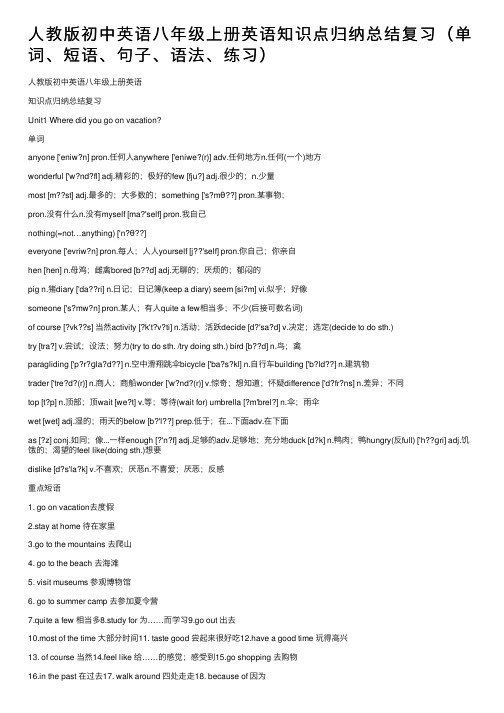
⼈教版初中英语⼋年级上册英语知识点归纳总结复习(单词、短语、句⼦、语法、练习)⼈教版初中英语⼋年级上册英语知识点归纳总结复习Unit1 Where did you go on vacation?单词anyone ['eniw?n] pron.任何⼈anywhere ['eniwe?(r)] adv.任何地⽅n.任何(⼀个)地⽅wonderful ['w?nd?fl] adj.精彩的;极好的few [fju?] adj.很少的;n.少量most [m??st] adj.最多的;⼤多数的;something ['s?mθ??] pron.某事物;pron.没有什么n.没有myself [ma?'self] pron.我⾃⼰nothing(=not…anything) ['n?θ??]everyone ['evriw?n] pron.每⼈;⼈⼈yourself [j??'self] pron.你⾃⼰;你亲⾃hen [hen] n.母鸡;雌禽bored [b??d] adj.⽆聊的;厌烦的;郁闷的pig n.猪diary ['da??ri] n.⽇记;⽇记簿(keep a diary) seem [si?m] vi.似乎;好像someone ['s?mw?n] pron.某⼈;有⼈quite a few相当多;不少(后接可数名词)of course [?vk??s] 当然activity [?k't?v?ti] n.活动;活跃decide [d?'sa?d] v.决定;选定(decide to do sth.)try [tra?] v.尝试;设法;努⼒(try to do sth. /try doing sth.) bird [b??d] n.鸟;禽paragliding ['p?r?ɡla?d??] n.空中滑翔跳伞bicycle ['ba?s?kl] n.⾃⾏车building ['b?ld??] n.建筑物trader ['tre?d?(r)] n.商⼈;商船wonder ['w?nd?(r)] v.惊奇;想知道;怀疑difference ['d?fr?ns] n.差异;不同top [t?p] n.顶部;顶wait [we?t] v.等;等待(wait for) umbrella [?m'brel?] n.伞;⾬伞wet [wet] adj.湿的;⾬天的below [b?'l??] prep.低于;在...下⾯adv.在下⾯as [?z] conj.如同;像...⼀样enough [?'n?f] adj.⾜够的adv.⾜够地;充分地duck [d?k] n.鸭⾁;鸭hungry(反full) ['h??ɡri] adj.饥饿的;渴望的feel like(doing sth.)想要dislike [d?s'la?k] v.不喜欢;厌恶n.不喜爱;厌恶;反感重点短语1. go on vacation去度假2.stay at home 待在家⾥3.go to the mountains 去爬⼭4. go to the beach 去海滩5. visit museums 参观博物馆6. go to summer camp 去参加夏令营7.quite a few 相当多8.study for 为……⽽学习9.go out 出去10.most of the time ⼤部分时间11. taste good 尝起来很好吃12.have a good time 玩得⾼兴13. of course 当然14.feel like 给……的感觉;感受到15.go shopping 去购物16.in the past 在过去17. walk around 四处⾛⾛18. because of 因为⼀碗…… 20. the next day 第⼆天21. drink tea 喝茶19. one bowl of… 22. find out 找出;查明23. go on 继续24.take photos 照相25. something important 重要的事26. up and down 上上下下27. come up 出来28. buy sth. for sb. / buy sb. sth. 为某⼈买某物29. taste + adj. 尝起来…… 动词原形除了……之外什么都没有30. look+adj. 看起来…… 31.nothing…but+32.seem+(to be)+ adj. 看起来…… 33. arrive in+⼤地点/ arrive at+⼩地点到达某地34.decide to do sth. 决定去做某事35. try doing sth. 尝试做某事/ 36. try to do sth. 尽⼒去做某事37. forget doing sth. 忘记做过某事/ 38. forget to do sth. 忘记做某事39. enjoy doing sth. 喜欢做某事40. want to do sth. 想去做某事41. start doing sth. 开始做某事42. stop doing sth. 停⽌做某事43. dislike doing sth.不喜欢做某事44. keep doing sth. 继续做某事45. Why not do. sth.? 为什么不做……呢?46. so+adj.+that+从句如此……以⾄于…… 47. tell sb. (not) to do sth. 告诉某⼈(不要)做某事48 .have a good time=enjoy oneself=have fun(doing sth.)玩得痛快三、重点句⼦:1. Where did you go on vacation? 你去哪⼉度假的?2. Long time no see. 好久不见。
- 1、下载文档前请自行甄别文档内容的完整性,平台不提供额外的编辑、内容补充、找答案等附加服务。
- 2、"仅部分预览"的文档,不可在线预览部分如存在完整性等问题,可反馈申请退款(可完整预览的文档不适用该条件!)。
- 3、如文档侵犯您的权益,请联系客服反馈,我们会尽快为您处理(人工客服工作时间:9:00-18:30)。
Unit One1. How often do you exercise ? → How often + 助动词do(does或did) + 主语 + do sth. ? 疑问词how often是问频率(多经常), 在这里助动词do(does 或did) 是起帮助构成疑问的作用Every day / Once a week / Twice a month / Three times a month / Three or four times a month .2. What do you usually do on weekends ? 第一个do 为助动词, 在这起帮助构成疑问的作用;而第二个 do 则是实义动词。
I usually play soccer .3. What’s your favorite program ? It’s Animal World .4. What do students do at Green High School ? 第一个do 为助动词, 在这起帮助构成疑问的作用;而第二个 do 则是实义动词。
5. As for homework , most students do homework every day . as for...意思是“至于;关于”,常用于句首作状语,其后跟名词、代词或动词的-ing 形式(即动名词)。
如:As for him,I never want to see him here. 至于他,我永远不希望在这里见到。
As for the story,you'd better not believe it. 关于那故事,你最好不要相信。
6. The results for “ watch TV ” are interes ting .7. Mom wants me to get up at 6:00 and play ping-pong with her . → want to do sth.意思是“想要做某事”;want sb. to do sth.意思是“想要某人做某事”。
如:Do you want to go to the movies with me?你想和我一起去看电影吗?The teacher doesn't want us to eat hamburgers.老师不想让我们吃汉堡包。
8. She says it’s good for my health . → be good for...表示“对……有益(有好处)”。
其反义为:be bad for...。
(这里for 是介词,后跟名词、代词或动名词)如:It's good for us to do more reading. 多读书对我们有好处。
Reading in bed is bad for your eyes.在床上读书对你的眼睛有害。
9. How many hours do you sleep every night ?10. I exercise every day , usually when I come home from school .11. My eating habits are pretty good . 这里pretty相当于very 。
12. I try to eat a lot of vegetables , usually ten to eleven times a week . → try to do sth.表示“ 尽力做某事” ,不包含是否成功的意思 / try doing sth. 表示“ (用某一办法)试着去做某事”。
如:You’d better try doing the experiment in another way. 你最好试试用另一种方法做这个试验。
13. My healthy lifestyle helps me get good grades . → help sb.(to) do sth.帮助某人做某事14. Good food and exercise help me to study better . → help sb. (to) do sth.帮助某人做某事 / 这里better是well的比较级,而不是good的比较级15. Is her lifestyle the same as yours or different ? =Is her lifestyle the same as your lifestyle or is her lifestyle different from your lifestyle ? → be the same as … / be different from …16. I think I’m kind of unhealthy . kind of = a little / a kind of 意思是“一种”17. What sports do you play ?18. A lot of vegetables help you to keep in good health . keep in good health = keep healthy = stay healthy19. You must try to eat less meat . → try to do sth. 表示“ 尽力做某事” , 不包含是否成功的意思 / less是little的比较级20. That sounds interesting. 这是“主语+系动词+表语”结构的简单句。
sound(听起来),look(看起来),smell(闻起来),taste(尝起来),feel (觉得),seem(好象),grow(变得) , get(变得)等词在英语中可用作系动词,后跟形容词作表语。
如:It tastes good. 这味道好。
The music sounds very sweet. 这音乐听起来很入耳。
The smoke grew heavier and heavier. 烟雾变得越来越浓了。
Unit Two1. What’s the matter ? What’s the mater with you ? with为介词,后跟名词、代词或动名词。
人称代词必须用它的宾格。
I have a cold / have a sore back / have a stomachache2. You should lie down and rest / drink hot tea with honey / see a dentist / see a doctor .3. I’m not felling well . 这里well表示身体状况,不能用good代替4. When did it start ? About two days ago .5. That’s too bad .6. I hope you fell better soon . 这里better是well的比较级7. Traditional Chinese doctors believe we need a balance of yin and yang to be healthy . 这里 to be healthy是动词不定式短语,作目的状语8. Maybe you have too much yin . too much后跟不可数名词,而too many 后跟可数名词复数9. It’s easy to have a healthy lifestyle ,and it’s important to eat a balanced diet . → It’s easy to do sth . 做某事容易/ It’s important to do sth . 做某事重要10. Everyone gets tired sometimes . 这里get连系动词,tired是形容词作表语,属系表结构11. A sore throat can give you a fever . → give sb. sth . = give sth. to sb. 把某物给某人12. Don’t get stressed out. It’s not healthy . 在这里get是连系动词,stressed out是表语13. I have a toothache . I need to see a dentist . → need意思为“需要” ,作实义动词时,后跟动词不定式,否定式为don’t /doesn’t / didn’t need (to do sth.) ;作情态动词时,只能用于否定句或疑问句中,否定式为needn’t(do sth.) ,除有过去式外,没有其它的形态变化14. Eat a balanced diet to stay healthy . to stay healthy是动词不定式短语,作目的状语15. I’m not feeling very well at the moment . at the moment = nowUnit Three1. What are you doing for vacation ? I’m babysitting my sister . Where are you going for vacation ? Italy .这是现在进行时的一种比较特殊的用法,用来表示按计划或安排要做的事情,现在还没有去做。
2. Who are you g oing with ? I’m going with my parents . with my parents 是介词短语,在这里作伴随状语,起修饰谓语动词are going的作用3. When are you going ? I’m going on Monday .4. What are you doing there ? I’m going hiking in the mountains .5. How long are you staying ? Just for four days . I don’t like going away for too long .疑问词hwo long是对时间长短或事物的长度提问,在这里是对时间的长短进行提问。
6. Have a good time . = Enjoy oneself . 玩得开心、愉快7. Show me your photos when we get back to school . → show sb. sth. = show sth. to sb. 把某给某人看8. I’m going to Hawaii for vaca tion . for vacation是介词短语,在这里作目的状语,起修饰谓语动词的作用9. What’s it like there ? 这里like是介词,而不是动词10. Can I ask you some questions about your vacation plans ? → ask sb. sth . 问某人某事11. Ben Lambert , the famous French singer , is taking a long vacation this summer ! → take a vacation 度假12. He thought about going to Greece or Spain , but decided on Canada . → think about 考虑 / decide on 决定这里的about和on都是介词13. “ I always take vacation in Europe ,” he said . “ This time I want to do something different .” → (1). want to do sth. (2). 修饰不定代词(something , nothing , anything等)的定语常放在不定代词的后面14. He plans to have a very relaxing vacation . → plan to do sth. 计划做某事15. I’m planning to spend time in the beautiful countryside .16. I just finished making my last movies . → fin ish doing sth. 完成做某事17. I hear that Thailand is a good place to go sightseeing . to go sightseeing是动词不定式短语,作a good place的后置定语18. She’s leaving for Hong Kong on Tuesday . → leave A for B 离开A 地去B地19. I want to ask you about places to visit China . to visit China是动词不定式短语,作places的后置定语20. I’m planning my vacation to Italy this weekend . to Italy是动词不定式短语,作my vacation的后置定语21. What should tourists take with them ? with them是介词短语,在这里作伴随状语,起修饰谓语动词take的作用22. Where are you leaving from ? leave from 离开某地(注:from是介词)Unit Four1. How do you get to school ? 疑问词how 在这里是对方式进行提问I ride my bike / walk / take the subway . By bike / bicycle / bus / train / subway / taxi / air / plane / ship / boat . On foot .How do I get there ? 因there是副词,所以不能说get to there Don’t worry . Let me look at your map . Ok , first … , next … . Then … .2. How long does it take ? 疑问词hwo long是对时间长短或事物的长度提问It takes about 25 minutes to walk and 10 minutes by bus .How long does t take you to get from home to school ?It takes twenty-five minutes . → take sb. some time to do sth. 花费某人……时间做某事3. Lin Fei’s home is about Kilometers from school .4. How far is it from your home to school ? It’s three miles .How far do you live from school ? I live 10 miles from school .疑问词how far在这里是对距离进行提问5. In other parts of the world , things are different .6. In China , it depends on where you are . → depend on 视……而定;决定于7. That must be a lot more fun than taking a bus .8. In North America , not all students take the bus to school . not all 是部分否定,意思是并不是所有的;不是全部的9. Other parts of the world are different from the United States .10. A small number of students take the subway . → a number of = many 许多11. What do you think of the transportation in your town ? → think of 对……有某种看法12. When it rains I take a taxi .13. I have a map but in Chinese .14. If you have a problem , you can ask a policeman .Unit Five1. Can you come to my party ?Sure , I’d love(like) to . / I’m sorry , I can’t . I have to help my parents .Can you play tennis with me ?情态动词can在这里起征求对方意见的作用。
